|
|
|
Sort Order |
|
|
|
Items / Page
|
|
|
|
|
|
|
| Srl | Item |
| 1 |
ID:
173264


|
|
|
|
|
| Summary/Abstract |
Reverse migration has mitigated the brain drain for many Asian countries. But can developing countries actually bring back their best overseas talent? How can this studymeasure the quality of that talent? And, if the best are not returning, why not? Is the ‘institutional culture’ within the scientific and academic institutions the cause? The authors address these questions by comparing full-time and part-time returnees in three national programs, using each scholar’s h-Index, the impact factor of the journals in which they publish, and the annual number of publications by each researcher. The findings show that, circa 2012–13, the strongest researchers returned only part-time. Second, returnees to the Chinese Academy of Sciences were weaker than returnees under national programs at universities. And third, universities whose presidents reformed the institutional culture at the school attracted better overseas talent than other universities. The findings, then, show that resistance to institutional change can undermine a state’s effort to promote its research and development while domestic reform can promote that endeavour.
|
|
|
|
|
|
|
|
|
|
|
|
|
|
|
|
| 2 |
ID:
124642
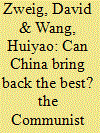

|
|
|
|
|
| Publication |
2013.
|
| Summary/Abstract |
For some developing countries, the international flow of their human talent in the recent decade was more of a "reverse brain gain" than a "brain drain." China, too, joined the group of states whose students, after studying abroad, now found sufficient opportunity and an acceptable quality of life back home to make returning after graduation a reasonable option. Still, China had not succeeded in bringing back the very best scientists and academics. To remedy this problem, the Organization Department of the Chinese Communist Party became actively involved in the recruitment process. The key programme was the "1000 Talents" Plan, introduced in 2008 by Politburo member Li Yuanchao, who had a visionary perspective on reverse migration. This programme has succeeded in bringing back entrepreneurs full time; but it has not attracted the very best of the Chinese scientists and academics who studied and lived overseas to return fulltime.
|
|
|
|
|
|
|
|
|
|
|
|
|
|
|
|
| 3 |
ID:
065399
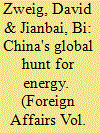

|
|
|
|
|
| Publication |
Sep-Oct 2005.
|
| Summary/Abstract |
Chinese foreign policy is now driven by China's unprecendented need for resources. In exchange for access to oil and other raw materials to fuel its booming economy, Beijing has boosted its bilateral relations with resource-rich states, sometimes striking deals with rogue governments or treading on U.S. turf. Beijing's hunger may worry some in Washington, but it also creates new grounds for cooperation.
|
|
|
|
|
|
|
|
|
|
|
|
|
|
|
|
| 4 |
ID:
078324
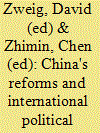

|
|
|
|
|
| Publication |
London, Routledge, 2007.
|
| Description |
xxi, 234p.
|
| Standard Number |
0415396134
|
|
|
|
|
|
|
|
|
|
|
|
Copies: C:1/I:0,R:0,Q:0
Circulation
| Accession# | Call# | Current Location | Status | Policy | Location |
| 052509 | 337.51/ZWE 052509 | Main | On Shelf | General | |
|
|
|
|
| 5 |
ID:
019400


|
|
|
|
|
| Publication |
March/April 2001.
|
| Description |
231-247
|
|
|
|
|
|
|
|
|
|
|
|
|
|
|
|
| 6 |
ID:
081280


|
|
|
|
|
| Publication |
2008.
|
| Summary/Abstract |
This paper uses a survey at six universities in China to analyze university students' views on China's energy problems. It finds that gender, the nature and location of a student's original community, and their level of education affects students' views about China's energy problems, as well as the types of solutions that are deemed to be most appropriate to manage this looming crisis. University students are quite concerned about China's energy situation. For them, it is already a crisis. They fear China will be controlled due to resource dependency, see the US as China's primary energy competitor, all the while advocating a more hawkish attitude towards Japan in the East China Sea. But, they look foremost to domestic solutions to this crisis, such as enhanced conservation, more efficient use of energy, new technologies, enhancing China's strategic reserve, and increased government taxation, particularly of large enterprises. When they look abroad, they support diversifying energy sources, increasing energy cooperation, particularly with Russia and Central Asia (but not with Japan), and some increase of the navy's role in enhancing sea lane and energy security
|
|
|
|
|
|
|
|
|
|
|
|
|
|
|
|
| 7 |
ID:
118690


|
|
|
|
|
| Publication |
2013.
|
| Summary/Abstract |
All Hong Kong universities have been actively influencing education in China since 1997. The major methods include: running an independent university in one case, and managing and transforming four colleges in another; training many mainland students in Hong Kong who upon graduation return there; and serving as a home base on the doorstep of the mainland from which academics can influence their colleagues across the border. This paper shows how all these methods transfer a new set of academic norms prevalent in Hong Kong to the mainland.
|
|
|
|
|
|
|
|
|
|
|
|
|
|
|
|
| 8 |
ID:
076961


|
|
|
|
|
| Publication |
2007.
|
| Summary/Abstract |
This paper assesses several assumptions underlying the promotion of democracy and good governance in rural China. We draw on a 1999 survey of 120 villages in four counties, two in Anhui and two in Heilongjiang provinces (sample of 2,997 households, including villagers, cadres and entrepreneurs). First, we look at how institutionalized 'democratic procedures', such as secret ballots, multi-candidate elections, public nominations, and village contracts, are in these villages. Then we analyze villager views on economic development and democracy, finding that villagers want more democracy, even if the economy is doing well. Third, we assess their views on the election process; do they see elections as efficacious, fair, and competitive, or do they feel that the local power elite manipulate outcomes? Fourth, we found that the richest people are less supportive of democracy, with the most democratic being middle-income households. Finally, elections have increased local elite turnover, cadres understand this, and therefore, democracy does lead to good governance.
|
|
|
|
|
|
|
|
|
|
|
|
|
|
|
|
| 9 |
ID:
057661


|
|
|
| 10 |
ID:
096589
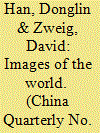

|
|
|
|
|
| Publication |
2010.
|
| Summary/Abstract |
Since the late 19th century many Chinese leaders have studied abroad, mostly in Japan, the US or the former Soviet Union. Recently, thousands are returning from studying overseas. Is this new cohort of returnees more internationalist than Chinese who do not study abroad? If their values differ and they join China's elite, they could influence China's foreign policy. Drawing on surveys of returnees from Japan and Canada over the past 15 years, we compare their views on "co-operative internationalism" and "assertive nationalism" with the attitudes of China's middle class drawn from a nationwide survey in 2006. Our returnees are both more "internationalist" than the middle class and less nationalistic. So they are likely to support China's increasing international role and perhaps constrain China's growing nationalist sentiment.
|
|
|
|
|
|
|
|
|
|
|
|
|
|
|
|
| 11 |
ID:
144174
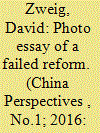

|
|
|
|
|
| Summary/Abstract |
In mid-1975, Deng Xiaoping, with Mao’s blessing, initiated reforms that targeted the negative consequences of the Cultural Revolution. To bolster Deng’s effort, Mao endowed him with penultimate authority over the Party, government, and military. However, in late October, Mao turned on Deng, and within five months, Mao and the radicals toppled Deng from power. As a foreign student at Peking University, David Zweig observed and photographed four key points in this historic struggle: (1) the initial establishment of a “big character poster” compound at Peking University; (2) emotional mourning for Zhou Enlai in Tiananmen Square following his death: (3) the intensified assault on Deng in February 1976 in the posters at Peking University; and (4) the massive demonstration of support in Tiananmen Square on 3-4 April for the end of Maoist politics.
|
|
|
|
|
|
|
|
|
|
|
|
|
|
|
|
| 12 |
ID:
104210


|
|
|
|
|
| Publication |
2011.
|
| Summary/Abstract |
Recent research on returning Chinese students has focused on their role as an alternative solution to their home country's mandate to build technological capacity. This study shows the depth of the 'brain circulation' that is underway and the fact that overseas students are not only serving China from abroad or by returning, but after they return they play a leading role in many aspects of China's 'going out' strategy. These returnee entrepreneurs present many advantages to the Chinese economy. They have studied at the best universities in the world, were deeply involved in the New Economy, and have gained valuable experience in listed companies overseas. They often possess venture capital, many have experience working with some of the best MNCs in the world, and they serve to contribute enormously to China's current economic engagement with the world. The paper describes the returnees' impact on China's globalization drive and analyzes the factors leading to their success in comparison to MNCs and indigenous Chinese firms.
|
|
|
|
|
|
|
|
|
|
|
|
|
|
|
|
|
|
|
|
|